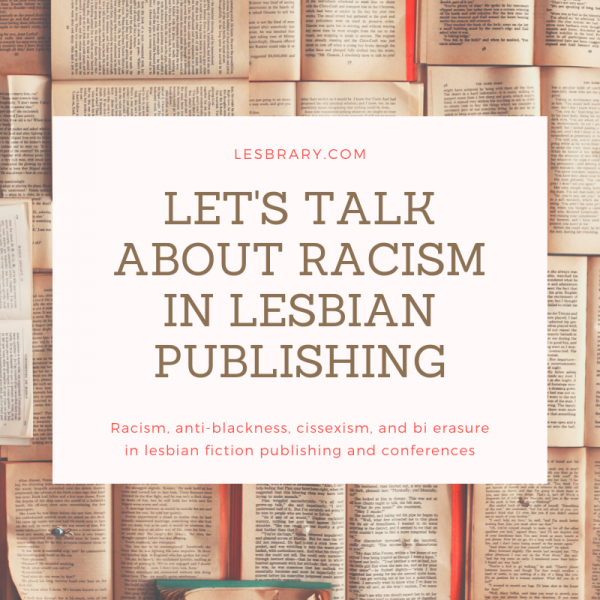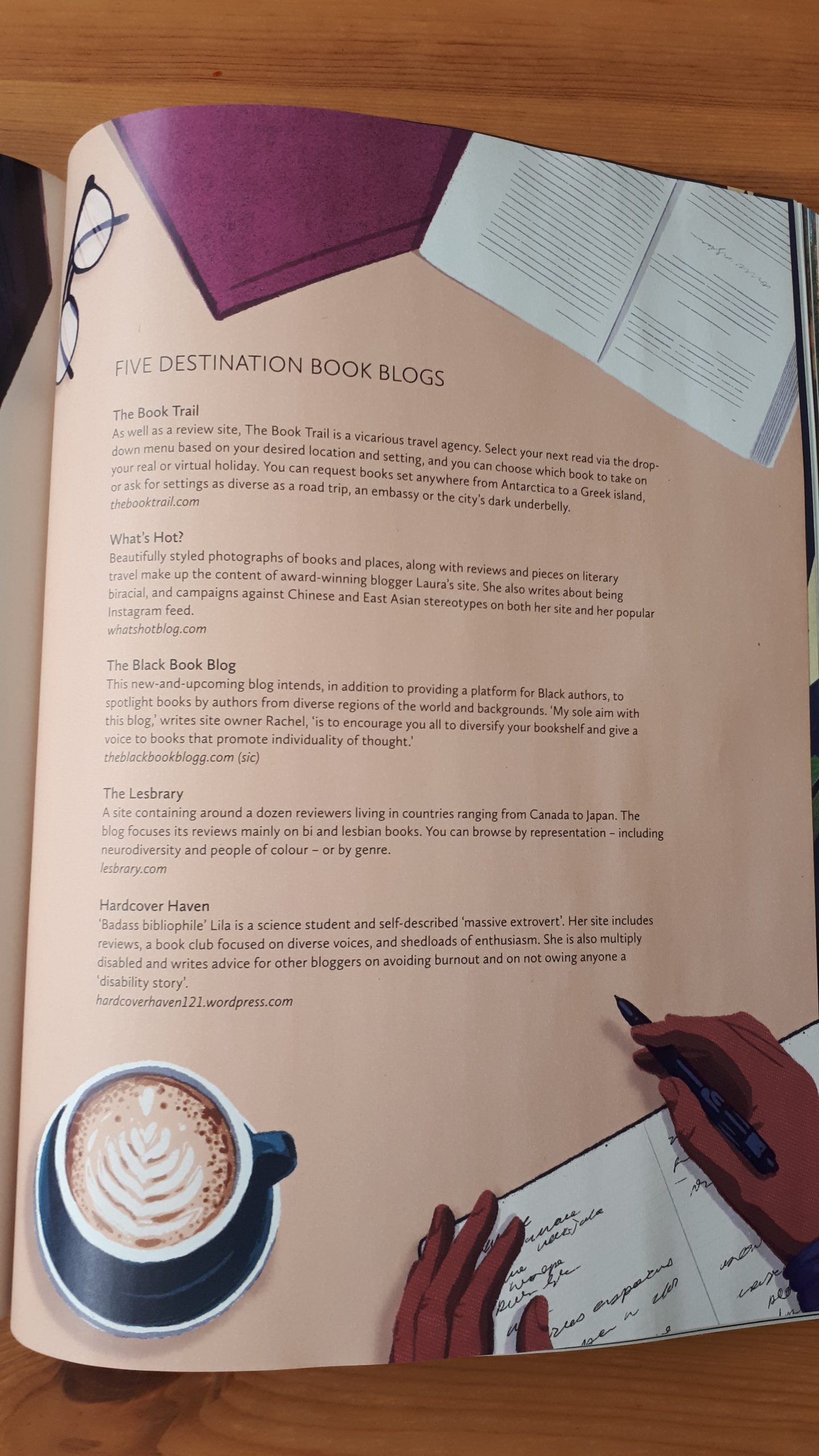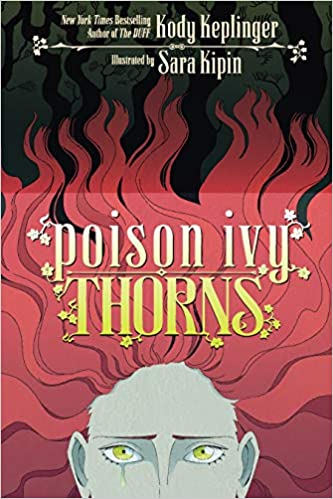
As we continue to have an international conversation about anti-blackness and systemic racism, it becomes more and more obvious how racism exists in every industry, and needs to be rooted out and addressed. Recently, KD Williamson, a Black f/f romance author, brought this discussion to the forefront in lesfic.
[Edited to add: of course, Black authors have been speaking out about this for years:]
Yes. I'm glad this is getting more visibility, but please know that Black writers have been screaming about this for years. This conversation did not start the other day. https://t.co/BkpEVHsYZN
— Dr. Stephanie Andrea Allen (@S_Andrea_Allen) June 24, 2020
First of all, what exactly is “lesfic”? It’s an abbreviation for “lesbian fiction,” but it’s usually used to mean a certain kind of lesbian fiction. It’s almost always f/f romance, and it’s usually published by a lesbian publisher (like Bold Strokes Books, Bella Books, or Ylva Publishing). Although I obviously read a lot of queer women lit, I’ve never been very involved in the “lesfic” world, so take these opinions with a grain of salt, but this is what I’ve observed. Lesfic seems to be a pretty insular environment. Authors are almost entirely white, middle-aged women–at least, the ones who get the most press are. It’s also specifically lesbian. Although there is the occasional bi woman character, that’s only when they’re in a f/f relationship, and even that is pretty rare.
GCLS is the Golden Crown Literary Society, an organization that promotes lesbian literature. It began in 2004, and began giving out awards and holding annual conferences in 2005. It’s this annual conference that began the conversation on twitter. KD Williamson pointed out that the conference’s invited authors are overwhelmingly white. This is not new, but it’s particularly troubling because this year’s event–due to COVID-19–was held entirely online. Because no one had to travel to participate, it offered an opportunity to reach out to a more diverse selection of authors. Unfortunately, that’s not what happened.
Afternoon @goldencrownls, I know you're in a middle of a convention, a convention that lacks representation from other marginalized groups that go under the umbrella of LGBTQIA. Lacks representation from other cultures such as Asian, Latinx, Black, etc. u know all us other ppl?
— KDWilliamson-Author/ Bi and Trans Supporter (@Rizzleslovr72) June 21, 2020
So that racism thing. This is how it plays out. Queer WOC, some of the lowest earners in our society, often can’t afford to fly to the conference. They finally have a chance to do it from their home, to find community. They looked at the program & were once again dissapointed.
— Mallory Lass 🏳️🌈 (@DataLover916) June 20, 2020
KD Williamson also pointed out that her complaints are about the homogeneity of lesfic as a whole: not just the lack of Black authors, editors, etc represented, but of people of colour in general, of bisexual people, of trans people.
Other authors began to join in that they, too, have experienced feeling unwelcome at GCLS. Amanda Radley wrote about how last year she had asked GCLS to change its naming conventions to be more accepting of bisexual and other non-lesbian queer authors. In response, GCLS changed the language to “lesbian-themed” instead of lesbian (??), but rejected the motion to include “bisexual” or any other labels.
https://twitter.com/clundoff/status/1275091857270177792
One Black author mentioned feeling unsafe at lesfic conferences because she found that some white authors there wouldn’t even speak to Black authors. Stephanie Andrea Allen spoke about trying to reform the GCLS awards process from the inside, and realizing that it was going nowhere, and wasn’t worth the energy:
Um, I was on the committee that redid the way they do the judging a few years ago and I knew then that it was hopeless. When was the last time a Black or writer of color actually won an award, not a trailblazer/legacy" award? Expanding the categories doesn't change the culture.
— Dr. Stephanie Andrea Allen (@S_Andrea_Allen) June 22, 2020
Many authors talked about how they had quietly walked away from GCLS and not bothered to even submit their books for awards, because they knew they wouldn’t be chosen. Rebekah Weatherspoon spoke about how being used as a token women of colour made for painful lesfic conference experiences:
https://twitter.com/RdotSpoon/status/1274878112572960774
This isn’t isolated to GCLS, however. It’s a systemic problem–in publishing in general, but also in lesfic in particular. Publishers and event organizers to drastically change to address this. Here’s what I suggest they do to get started:
1) You can’t fix a problem until you’ve identified it. Do you have data on your organization?
- What percentage of the people at your organization/business are white?
- What about the authors you publish?
- If you don’t know, start from there. Do an internal audit.
2) Do those numbers reflect the greater population?
- But also keep in mind that you are speaking to a global audience.
3) What are your internal policies around antiracism?
- What concrete policies do you have to make a safe working environment for people of color?
- Kay Acker added: “If anti-racism policies are in place, what are the concrete plans for enforcement? Are the expectations and steps in the process clear? Who has to report issues, and how are the reporters protected?”
- Do you require antiracism training for your employees?
- For editors and employees who work closely with authors, what policies do you have around their interactions with authors, especially authors of color?
4) If your organization is disproportionately white, what strategies will you use to fix that?
- What goals do you have, and what’s your plan to get there?
- How can you reach out to potential employees of color?
- Do you have an internship program? Is it paid?
- Where do you advertise job openings?
- Do you have a mentorship program?
- If you don’t know how to find employees of color–do the research. Hire someone to figure it out.
- Tara Scott added: “what will you do to bring Black women and other WOC into editing and acquiring books? When your white authors are writing BIPOC characters, will you pay sensitivity readers to ensure the books aren’t full of microaggressions?”
5) For publishers:
- What percentage of the books you publish each year are by authors of color?
- What is your goal? What’s your plan to get there?
- What does your contract look like?
- Do you rely on agents to find new authors?
- How might these be barriers to acquiring authors of color?
- Are your rates competitive?
- How can you make your company more welcoming and safe for authors of color?
- Are the people that the authors work closely with people of color?
- Heather Rose Jones added: “When an author is looking for potential publishers for their work, they look to see who and what that publisher is already publishing. Publishers can’t just passively say, “why don’t POC submit to us?” if they don’t look interested.”
- This is something LGBTQ publishers should be aware of! Perceived hostility by general publishers is probably how you got started!
6) For event organizers:
- What percentage of the authors at your events are people of color?
- What is your goal? What’s your plan to get there?
- Do you pay authors?
- Do you pay for their transportation costs and accommodations?
- What barriers might exist for authors of color?
- How will you fix them?
7) While you are doing this work, consider other intersectionalities: most of these same questions should be asked for disabled people and trans people as well.
To be clear: I can only speak from my own perspective, and I’m white, so I will have oversights. Please add anything I’ve missed! The Lesbrary has a long way to go, too. I only recently added a max percentage of white authors to cover as a reviewer, and I need to diversify my own reading more, and reach out to more reviewers of colour. I commit to keep doing this work.
After I posted this on twitter, Bywater Books reached out to me to discuss their new imprint, Amble Press, which is run by an author of colour and was started to acquire more authors of colour (while continuing to add authors of colour to Bywater Books as well).
[Edited to add: The imprint was also started for male and non-binary authors, however, and it looks like so far only one of the three authors they have signed on is a person of colour, though the imprint is new and still revolving. KD Williamson also points out that separate imprints for authors of color is not what they’re asking for:]
This can sometimes be a veiled microaggression to keep POC/AOC from competing with the white folk. It can be used to placate so they can say 'see what we did for you?'
Separate but equal.
SHAME ON YOU.— KDWilliamson-Author/ Bi and Trans Supporter (@Rizzleslovr72) June 24, 2020
This isn’t a particularly organized post, because the situation is still evolving, but I wanted to put it out there as an introduction into the conversation, especially if you’re not on twitter.
Finally, if you’re looking for Black f/f authors, here are some of the names that came up during this conversation!
- S. Andrea Allen, author of Lez Talk: A Collection of Black Lesbian Short Fiction, Failure to Communicate, and more
- T. Ariez, author of Turn Me Out
- Verde Arzu, author of Rainbow
- Cheril N. Clarke, author of The Beautiful People: New York City, Sweet Dark Rum, and more
- Sheree Greer, author of Return to Arms, Let the Lover Be, and more
- LaToya Hankins, author of SBF Seeking…, Married to the Struggle, and more
- AM McKnight, author of Goslyn County, Country Vices, and more
- Nik Nicholson, author of Descendants of Hagar, Seeking Sex Without Armor, and more
- Anne Shade, author of Deepest Desire and Femme Tales
- Ann Allen Shockley, author of Loving Her, Say Jesus and Come to Me, and more
- Skyy, author of Choices, Crossroads, and more
- Monique Thomas, author of Craving Comfort, Love Relived, and more
- Rebekah Weatherspoon, author of Better Off Red, Treasure, and more
- KD Williamson, author of Cops and Docs, Big Girl Pill, and more
- Fiona Zedde, Bliss, Every Dark Desire, and more
As well as the organizations Black Lesbian Literary Collective and Sistahs on the Shelf.
At the Lesbrary, you can also check out:
- Black Bi & Lesbian Book Recommendations
- Reading Black Joy: F/F Romances by Black Authors
- 10 Poetry Collections by Black Queer Women
- The tags Black (for main character), Black author, POC (for main character), and author of color
While you’re here, check out the Black Lives Matter carrd for petitions to sign, places to donate, resources to educate yourself, and more. Also, support Black LGBTQ authors and Black-owned bookstores.

